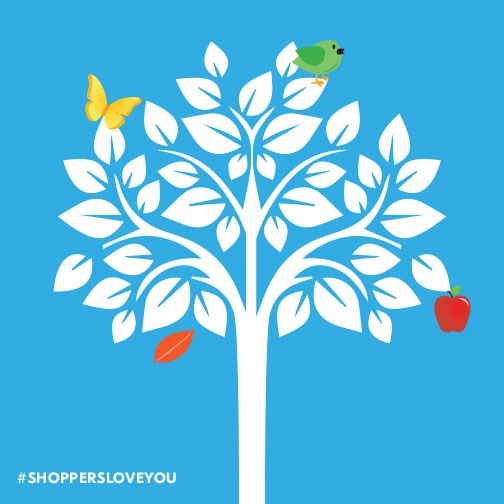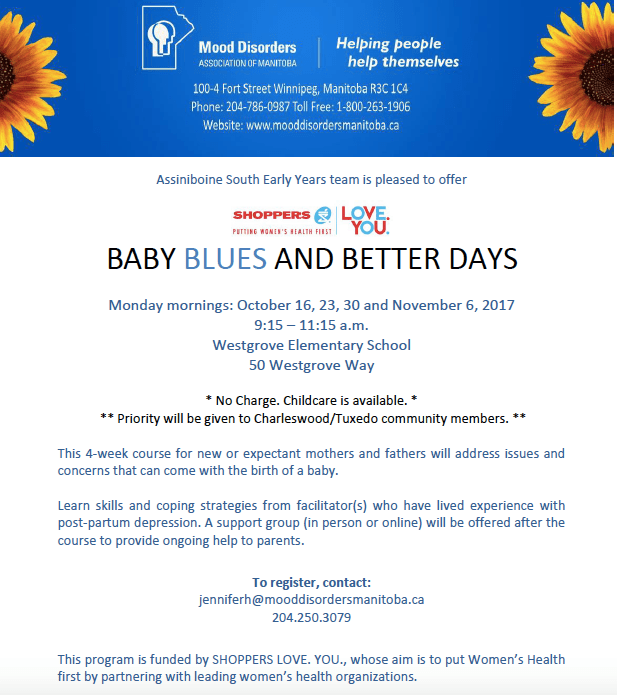It’s not a secret that I am a big fan of the community events that Shoppers Drug Mart organizes across the country.
Thanks to the SHOPPERS LOVE. YOU. Run For Women, I ran my very first 5K!
In support of growing women’s health across the country, Shoppers Drug Mart’s 16 year campaign comes back to Manitoba for a fourth time to support the Mood Disorders Association of Manitoba.
The Mood Disorders Association of Manitoba (MDAM) is an extremely vital part of supporting mental health initiatives in the province.
I had the opportunity speak to Jennifer Hanslip, Director of Post-Partum Peer Services from the MDAM about what the association is, who accesses it and how they became part of the national campaign.
Here is an edited transcript of our wonderful interview (give or take). We chatted for a LONG time with great reason of course!
INTERVIEW
NB: Jennifer, tell us about Mood Disorders Association of Manitoba, what is it all about and who can benefit from its services?
JH: The MDAM has been around since 1983. The association offers peer support, education and advocacy to all of Manitoba. Last year we helped approximately 95,000 people in our province! Volunteers at the MDAM office are available to meet one on one or via phone daily from 9am-9pm, (also now including weekends). People with mood disorders, or co-occurring disorders have an opportunity to speak to someone with “lived experience”, not a counselor or doctor etc.
NB: I wasn’t aware of the many services the MDAM provides especially the peer support option. I’m so glad I have the opportunity to share that now. Many programs are geared towards women but the services are available to everybody, is that correct?
JH: Absolutely, there are a variety of programs available for anybody: men, those with depression, parents, LGBTQ, etc.
BABY BLUES AND BETTER DAYS WORKSHOP
NB: Tell us about the Baby Blues and Better Days workshop which is a part of the Growing Women’s Health campaign.
JH: The pilot for Baby Blues and Better Days was run in 2015 by Tara Brousseau Snider, Executive Director. The timing worked out perfectly as in Jan 2016 I happened to offer to volunteer with the organization as I had a history with postpartum depression and had my own support group. I knew about the postpartum WarmLine since fall 2013. Tara asked if I was interested to teach the Baby Blues workshop, I ran one in April 2016 and it went well, subsequently I was hired! I ran 3 courses in 2016 and 3 so far in 2017 with 2 more coming up this fall. It’s been a dream job and everything came together at the right time.
NB: I’ve had numerous people around me suffer from postpartum depression and I have personally experienced the impact. What does the workshop touch on, and how deep do you get on the topic? Is it interactive? Do participants get tools to walk away with?
JH: The workshop runs over 4 weeks and the content builds on itself from week to week.
Week 1: What is postpartum depression? What are the Baby Blues? What is postpartum psychosis and anxiety. As I spoke to more people I recognized the same recurring theme about postpartum anxiety. The emphasis has primarily been on postpartum depression, but thanks to that feedback, I added in the anxiety focus as well.
STAT: 80% of women get baby blues, 20% get postpartum depression. In Winnipeg alone there are 10,000 births a year – that’s 2,000 women PPD affects!
We encourage that feeling this way is not bad, it’s normal. We discuss risk factors and various treatment options – why some people will go on medication, and why some won’t etc.
Week 2: Relationships and Finances- Many people think having a baby will solve everything if their relationships are rocky. Things change and we talk about the stresses, how to rekindle relationships, and ideas to reduce financial strains. We talk about dads and how they can also get postpartum depression (they are more than welcome to attend – this doesn’t just affect the moms)!
Week 3: We focus on wellness and self care. Everybody should have time for themselves! As person before you become a mom, you probably had time for yourself, suddenly an all-consuming baby comes along and you put yourself last. It’s so important not to do that. We talk about taking care of yourself and ideas on how to do that. We use some cognitive behaviour principles and mindfulness tips as well.
NB: I have a problem with self care now – it still happens and my kids are older!
JH: Absolutely it does!
In Week 4 – we wrap up with the myths and expectations of motherhood, the various resources available and different social supports. We discuss the idea about the fact that “It truly takes a village”, who is in the village and how do you build your village. We talk about how to connect with other people and participants take home a Mom’s Survival Kit with ways to connect featuring local and national resources.
NB: A lot of the information you’re discussing is transferable throughout your kids’ lives!
JH: After the course is over, people leave with so many resources, including continuing support on Facebook group (only for people who attended the course). We like to keep up the conversation.
NB: That’s a key factor for sure.
JH: Monthly on the 3rd Wednesday of the month from 1-3pm, MDAM offers a support group on a drop-in basis.
You had asked if it’s interactive – we definitely try. The first week is a lot of information but we get into personal stories in the weeks that follow. Sometimes i have a co-facilitator with lived experience. I talk about my own experience, and its uniqueness to me but my case came hard and fast, almost tragic. Other cases build and some people are in denial about it. So we try to have more people facilitate to share their unique stories if they are comfortable.
NB: When you first experienced postpartum depression were you a part of the Mood Disorders of Association of Manitoba?
JH: Nope! It hit me in 2006 with my first child – I knew nothing about MDAM at the time. My way of getting help was that I had a Public Health Nurse who went above and beyond to make sure I got the help that I needed. Unfortunately I’ve spoken with some people who don’t necessarily build that rapport with their Public Health Nurse after the first few visits. I always encourage to build that relationship, as you never know when you may need that assistance.
NB: With the Growing Women’s Health campaign, why was postpartum depression the number one topic to choose to support? I recognize it’s a very popular topic, but I am curious as to the catalyst for this one.
JH: Funny enough I am about to do a presentation on that very question in the coming weeks and I had asked my boss about how the relationship with Shoppers Drug Mart began! The program was started as a result of Lisa Gibson’s death, it shook the city. MDAM had been offering postpartum groups in the different regions but not a specific postpartum program. Marilyn, an associate from SDM, had attended the vigil (as Lisa had been a pharmacist). Marilyn put forth the proposal that the first run proceeds should go to the MDAM. $16,000 was raised and the Baby Blues and Better Days workshop was produced as result of that partnership.
I want to thank Jennifer for such an amazing interview, I’m glad we had the chance to talk about this workshop and the fabulous work that the Mood Disorders Association of Manitoba is doing in our community. Details are listed below:

